This essay appeared in the January 20, 1917 edition of The New Republic. Although its origins come some twenty years after the publication of The Awakening, many of the sentiments could have been uttered by Edna Pontellier. Consider the context and tone of the remarks to understand more about Edna’s state of mind.
A Middle-Class Wife
Alice Austin White
 I HAVE two babies; I hope they may never know how warmly at this moment I hate them. I have a husband; we were married because we were very much in love-and him I hate too. I have a large stock of relatives, and them I hate with the heart and should hate with the hand if I had not the misfortune to be well brought up. This emotion of mine, especially in connection with my spouse and offspring, is, up to the present, local and temporary; indeed I think it will not grow into a permanent hatred, but will gradually assume two peculiar forms: toward my children a passionate and slavish devotion, which will make me resent my daughters-in-law; and toward my husband regards, reasonably kind, which will be reciprocated. My feeling toward my relatives, on the other hand, is becoming quite, quite fixed.
I HAVE two babies; I hope they may never know how warmly at this moment I hate them. I have a husband; we were married because we were very much in love-and him I hate too. I have a large stock of relatives, and them I hate with the heart and should hate with the hand if I had not the misfortune to be well brought up. This emotion of mine, especially in connection with my spouse and offspring, is, up to the present, local and temporary; indeed I think it will not grow into a permanent hatred, but will gradually assume two peculiar forms: toward my children a passionate and slavish devotion, which will make me resent my daughters-in-law; and toward my husband regards, reasonably kind, which will be reciprocated. My feeling toward my relatives, on the other hand, is becoming quite, quite fixed.
It is all the fault of the children. I wanted children very much; I am fond of children, mentally and physically; and the sheer normality of having them I rejoice in. Furthermore, having been an only child myself, I wanted my children close together so that they might enjoy one another all the way up. I seemed to think I could have babies as easily as a geranium has red blossoms. But I find they commonly come rather hard and that I am not the only woman who for months after a baby is born has an aching body and a dull mind and a defective sense of humor. During this period one’s husband is very fatherly toward one, and one begins to feel the small asp of hate nipping at one’s heart.

The semi-invalidated stage that I have gone through with each of my babies is well past: I am normally sturdy—I have to be. I shall not tell over the tale of the things there are to do, cooking and mending and washing and baby-tending. It happens that I relate my daily household misadventures in a way diverting to my relatives, and they think I dote on housework. A really model wife and mother, say my kin; so unexpected, they say, considering her education, and all. And when I crawl to bed at half past eight, no thought save detail of housework and child-rearing has found place in my mind all day; I have done no reading save snips from a book propped against the sink faucets while I washed dishes; and I have simply heard, not shared even mentally such stimulating conversation as my husband brings home to dinner.
I know house and children ought not to take all my day and all my strength. If I had had special training in domestic science and child-psychology and nursing I should doubtless be able to do my work in less time and with far less effort. But in college and university I flew straight in the face of providence, which is a war-name of advising relatives, and worked at mathematics, while in the spare time which I might have devoted to stray courses in home economics as a sop to the gods, I took ‘cello. Furthermore, I am glad of it. If I were to have a vacation tomorrow and a financial windfall, I should take two courses in mathematics at the university, and a ‘cello lesson a week, and bask in it as my sister-in-law does in chiffon underwear.
You ought to have help, say my relatives, and I add a verse to my hymn of hate for them. Among the qualities for which I love my husband are generosity, sensitiveness, modesty and conscientiousness, and I take it each of these characteristics has lower money-making value than the others. Some day when we have got middle-aged, we shall have the salary we need now; and just about that time our relatives will die and leave us money we could get on without. If I happened to be male instead of female, which God forfend, could double the family income by teaching at the university, but the university does not yet see its way to employing women on its teaching staff, and I therefore scrub the square of my kitchen floor instead.
 The truth is, however, that it is not a floor-scrubber and dishwasher that I desire. I could get along with that work or leave it happily undone. It is the care of two children under three that concerns me. It is unremitting and nerve-tearing, and the day in and day out of it is under mining mercilessly my ability to be lovable and to love. Furthermore, I have not the qualifications that would justify entrusting me with sole responsibility for the growth of human beings. Maternal instinct I have in normal amount; I could be trusted to rescue my infants from a burning building, but that is a very different matter from knowing what to do with twenty-four hours’ worth of bodily and mental development every day. I do not want a nursemaid; I have no training for my job, but I have an occasional vagrant idea, and it does not appeal to me to exchange my services to my offspring for those of a hand-maiden with neither training nor ideas. The helper for me should be a trained psychologist, a child-lover, to be sure, but a child-lover with expert knowledge of the needs of growing minds. She should have also training in the treatment of the smaller physical ailments of children. She ought to cost me two thousand dollars a year, but in the present state of women’s wages I have no doubt I could get her for a thousand. And I want her only half the day-five hundred dollars. Our income is sixteen hundred.
The truth is, however, that it is not a floor-scrubber and dishwasher that I desire. I could get along with that work or leave it happily undone. It is the care of two children under three that concerns me. It is unremitting and nerve-tearing, and the day in and day out of it is under mining mercilessly my ability to be lovable and to love. Furthermore, I have not the qualifications that would justify entrusting me with sole responsibility for the growth of human beings. Maternal instinct I have in normal amount; I could be trusted to rescue my infants from a burning building, but that is a very different matter from knowing what to do with twenty-four hours’ worth of bodily and mental development every day. I do not want a nursemaid; I have no training for my job, but I have an occasional vagrant idea, and it does not appeal to me to exchange my services to my offspring for those of a hand-maiden with neither training nor ideas. The helper for me should be a trained psychologist, a child-lover, to be sure, but a child-lover with expert knowledge of the needs of growing minds. She should have also training in the treatment of the smaller physical ailments of children. She ought to cost me two thousand dollars a year, but in the present state of women’s wages I have no doubt I could get her for a thousand. And I want her only half the day-five hundred dollars. Our income is sixteen hundred.
Such a woman as I have in mind, however, take charge of a very appreciable number of children along with my important two. For five or six hours a day she could take care of a nursery-full, and still have time for life and love; while the sigh of relief that a mother breathes when she ties her son’s Windsor under his chin and posts him off to school would be breathed five years earlier. Indeed she might enjoy her children, and the sigh be dispensed with. Four hours a day of freedom for us educated, reasonably intelligent, good-stock, middle-class mothers—! The possibilities are limitless. We might even have more children.

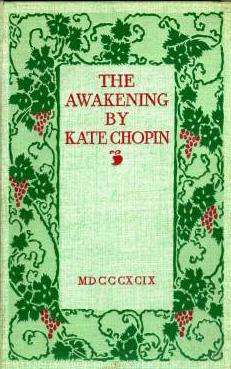
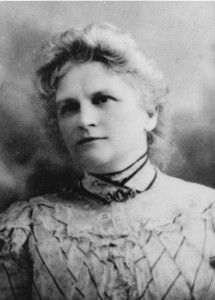
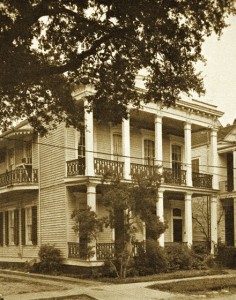
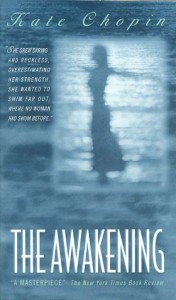
 I HAVE two babies; I hope they may never know how warmly at this moment I hate them. I have a husband; we were married because we were very much in love-and him I hate too. I have a large stock of relatives, and them I hate with the heart and should hate with the hand if I had not the misfortune to be well brought up. This emotion of mine, especially in connection with my spouse and offspring, is, up to the present, local and temporary; indeed I think it will not grow into a permanent hatred, but will gradually assume two peculiar forms: toward my children a passionate and slavish devotion, which will make me resent my daughters-in-law; and toward my husband regards, reasonably kind, which will be reciprocated. My feeling toward my relatives, on the other hand, is becoming quite, quite fixed.
I HAVE two babies; I hope they may never know how warmly at this moment I hate them. I have a husband; we were married because we were very much in love-and him I hate too. I have a large stock of relatives, and them I hate with the heart and should hate with the hand if I had not the misfortune to be well brought up. This emotion of mine, especially in connection with my spouse and offspring, is, up to the present, local and temporary; indeed I think it will not grow into a permanent hatred, but will gradually assume two peculiar forms: toward my children a passionate and slavish devotion, which will make me resent my daughters-in-law; and toward my husband regards, reasonably kind, which will be reciprocated. My feeling toward my relatives, on the other hand, is becoming quite, quite fixed.
 The truth is, however, that it is not a floor-scrubber and dishwasher that I desire. I could get along with that work or leave it happily undone. It is the care of two children under three that concerns me. It is unremitting and nerve-tearing, and the day in and day out of it is under mining mercilessly my ability to be lovable and to love. Furthermore, I have not the qualifications that would justify entrusting me with sole responsibility for the growth of human beings. Maternal instinct I have in normal amount; I could be trusted to rescue my infants from a burning building, but that is a very different matter from knowing what to do with twenty-four hours’ worth of bodily and mental development every day. I do not want a nursemaid; I have no training for my job, but I have an occasional vagrant idea, and it does not appeal to me to exchange my services to my offspring for those of a hand-maiden with neither training nor ideas. The helper for me should be a trained psychologist, a child-lover, to be sure, but a child-lover with expert knowledge of the needs of growing minds. She should have also training in the treatment of the smaller physical ailments of children. She ought to cost me two thousand dollars a year, but in the present state of women’s wages I have no doubt I could get her for a thousand. And I want her only half the day-five hundred dollars. Our income is sixteen hundred.
The truth is, however, that it is not a floor-scrubber and dishwasher that I desire. I could get along with that work or leave it happily undone. It is the care of two children under three that concerns me. It is unremitting and nerve-tearing, and the day in and day out of it is under mining mercilessly my ability to be lovable and to love. Furthermore, I have not the qualifications that would justify entrusting me with sole responsibility for the growth of human beings. Maternal instinct I have in normal amount; I could be trusted to rescue my infants from a burning building, but that is a very different matter from knowing what to do with twenty-four hours’ worth of bodily and mental development every day. I do not want a nursemaid; I have no training for my job, but I have an occasional vagrant idea, and it does not appeal to me to exchange my services to my offspring for those of a hand-maiden with neither training nor ideas. The helper for me should be a trained psychologist, a child-lover, to be sure, but a child-lover with expert knowledge of the needs of growing minds. She should have also training in the treatment of the smaller physical ailments of children. She ought to cost me two thousand dollars a year, but in the present state of women’s wages I have no doubt I could get her for a thousand. And I want her only half the day-five hundred dollars. Our income is sixteen hundred.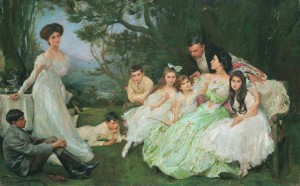
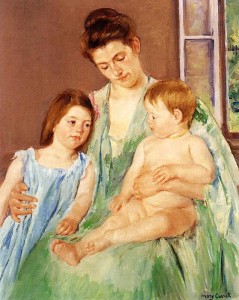
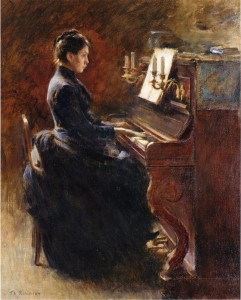
Video Study Guide: The Awakening
Alas, until Sparky Sweets, Ph.D. and the good folks at Thug Notes produce one for The Awakening, we’ll have to look for other sources. This video study guide from Brittany Reads is quite good. Check the file on YouTube for more links.
https://www.youtube.com/watch?v=WRdTRpXnLPM
Comments Off on Video Study Guide: The Awakening
Filed under AP Literature
Tagged as analysis, AP, books, commentary, The Awakening